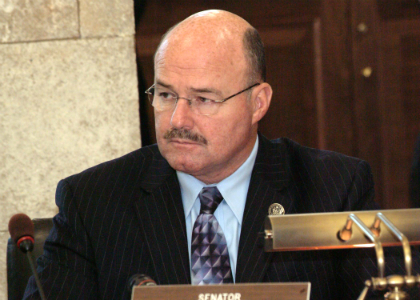
TRENTON – Legislation sponsored by Senator Fred H. Madden that would require all physical examinations of children under the age of 19 to include questions about the child’s cardiovascular disease risk was approved by the Senate today. The bill would also ensure that all healthcare professionals who conduct physical examinations of children are properly licensed to identify cardiac risks and that they participate in continuing education courses.
The legislation is part of a series of bills sponsored by Madden that aims to reduce the number of sudden cardiac deaths suffered by children. Approximately 2,000 apparently healthy children die suddenly from cardiac conditions each year in the United States. While some cardiac conditions have no identifiable inheritable pattern, other cardiac conditions may be identified through a thorough evaluation of a child, along with his or her family history.
“We have made great strides in trying to identify cardiac problems with our student athletes, but we must recognize children who are not playing school sports are also susceptible to heart conditions that cause sudden death,” said Madden (D-Gloucester, Camden). “This bill guarantees that students who are not participating in sports get the same level of scrutiny for cardiac risk as those who do.”
The bill, S-471, would require that all annual medical examinations of children under the age of 19 include questions contained in the “Preparticipation Physical Evaluation” form, which was developed jointly by the American Academy of Family Physicians, the American Academy of Pediatrics, the American College of Sports Medicine, the American Medical Society for Sports Medicine, the American Orthopedic Society for Sports Medicine, and the American Osteopathic Academy of Sports Medicine.
The “Preparticipation Physical Examination” form is currently used to evaluate a student’s cardiac well-being in advance of any participation in scholastic athletics. The bill would require that all physical examinations performed on children include these stringent questions about cardiac health, not only those that are required prior to participating in interscholastic or intramural sports.
The measure would require the Commissioner of Health to develop a cardiac screening professional development module to increase the assessment skills of those health care practitioners who perform annual physical examinations of children. Under the legislation, a physician, advanced practice nurse, or physician assistant who performs these examinations would have to complete the module as a condition of licensure renewal.
“With the stakes so high, we have to make sure we seize every opportunity to detect potential cardiac problems,” said Madden. “This legislation helps ensure that medical professionals are properly trained to perform cardiac screenings.”
The bill passed the Senate by a vote of 37-0 and now heads to the Assembly.
Madden has been the leading legislative advocate for measures to promote cardiac health among children and student athletes in New Jersey. He helped create the “New Jersey Student Athlete Cardiac Screening Task Force” to find the best ways to increase awareness of the threat to young people and prevent the sudden and tragic deaths of those at risk. Following through on recommendations of the task force, Madden authored a package of bills that includes the “Children’s Sudden Cardiac Events Reporting Act,” which would require the reporting of children’s sudden cardiac events and establish a statewide database to keep track of the information, and a measure that would require certain health insurers to provide coverage for physical exams that determine if a student is able to participate in athletic or camp activities.
Madden also sponsored the “Scholastic Student Athlete Safety Act,” which would establish advanced cardiac screening methods for student athletes in grades six to 12 who participate in interscholastic or intramural sports.
The package of bills has been signed into law.



